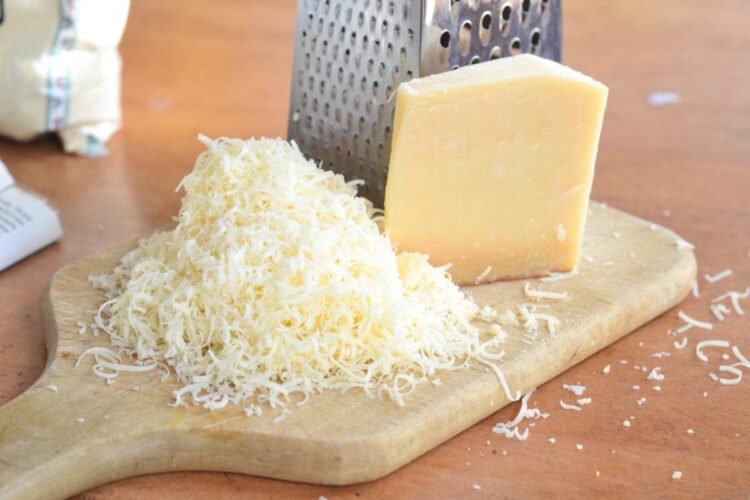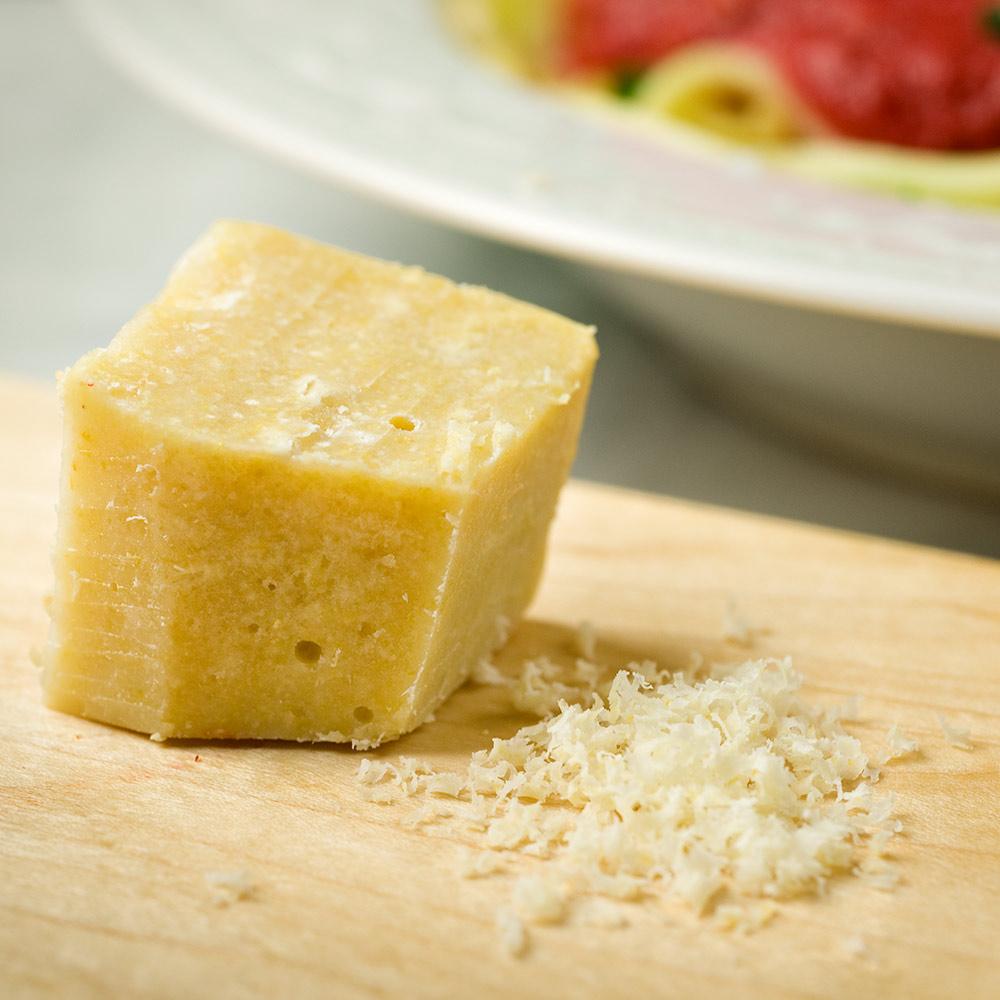Uh Oh! Your grated Parmigiano Reggiano could contain more wood pulp than parmesan cheese, studies suggest. The FDA allows cheese to contain up to 4% cellulose. By Guest Writer Fiona MacDonald, ScienceAlert.com. Healthy Solution: Buy hard cheese and grate it yourself. Even better, try my dairy-free, vegan, Paleo Parmesan Cheese. You won’t believe how delicious it tastes!!
Click to see my surprising recipe for dairy-free, vegan, Paleo Parmesan Cheese!
There’s nothing better than fresh parmesan sprinkled on a hot bowl of zoodles. But several investigations suggest that pre-grated cheese isn’t what you think it is, and it might not even be what it says on the label.
In fact, some grated cheeses sold as “100% parmesan” contain no parmesan at all – but they do contain a fair chunk of harmless wood pulp, according to independent analysis.
The first evidence of this came in 2012, when the US Food and Drug Administration (FDA) responded to an anonymous tip off, and performed an unannounced inspection on the Castle Cheese Inc. factory in Pennsylvania.
The first evidence of this came in 2012, when the US Food and Drug Administration (FDA) responded to an anonymous tip off, and performed an unannounced inspection on the Castle Cheese Inc. factory in Pennsylvania.
Their analysis revealed that “no parmesan cheese was used to manufacture” the Market Pantry brand 100 percent grated Parmesan Cheese, which had been sold at Target stores around the country.
Instead, the cheese was made up of Swiss, mozzarella, and cheddar cheese; plus cellulose, which is made from wood pulp, and stops cheese from clumping.
Before you freak out, cellulose isn’t that unusual to find in cheese, and the FDA permits it as a safe additive. But the acceptable industry standard is around 2 to 4 percent – just enough to keep the cheese stable.
The FDA didn’t release the exact percentage of cellulose in the Castle Cheese parmesan, but Bloomberg News has now conducted their own investigation on a range of brands – performed by independent testers – and has found that some products contain at least double that amount.
According to their results:
- Essential Everyday 100 percent Grated Parmesan Cheese, from Jewel-Osco, was 8.8 percent cellulose
- Wal-Mart Stores Inc.’s Great Value 100 percent Grated Parmesan Cheese registered 7.8 percent
- Whole Foods 365 brand didn’t list cellulose as an ingredient on the label, but still tested at 0.3 percent
- Kraft had 3.8 percent
In 2014, an anonymous cheese industry executive told the Milwaukee Journal Sentinel that some grated Parmesan cheese contains 20 percent or more cellulose.
The brands in question have responded and said they’re investigating the claims to ensure the quality of their products. And it needs to be said that these results haven’t been peer-reviewed or replicated, so we can’t say for sure how accurate they are.
But, as informal as it is, the study raises a big question mark over the content of our parmesan. Another analysis of 28 brands of grated parmesan conducted by DairiConcepts – a Missouri-based cheesemaker – found that only one-third met protein levels claimed on the label. DairiConcepts blames this in part on fillers such as cellulose.
So what is parmesan supposed to be? In the 1950s, the FDA established an official definition for parmesan, which stated, among other things, that it couldn’t contain more than 32 percent moisture, must have a granular texture, come with a hard and brittle rind, grate readily, and be made from cow’s milk.
But to achieve those specifications takes time and money, because parmesan takes months to dry out – for the same amount of milk, producers are able to make a whole lot more softer cheese, such as cheddar and mozzarella.
When parmesan comes in a block, it’s pretty hard to fake it, but by substituting some of the pre-grated products with these varieties – and adding a little extra cellulose – manufacturers can save millions.
The problem is that these manufacturers haven’t changed the label to reflect this composition, and due to the popularity of parmesan, are claiming that their products are “100 percent parmesan”.
The FDA is now cracking down in a serious way on this practice. In the past it hadn’t criminally prosecuted mislabelling cases because of the focus on food safety, but that’s changed over the past year.
Not only did Castle Cheese go bankrupt after the investigation, the president, Michelle Myrter, is expected to plead guilty to criminal charges later this month about the cheese mislabelling – she faces up to a year in prison and $100,000 in fines.
However, as frustrating as it is to not get what you paid for, rest assured that, for now, there doesn’t seem to be any health concerns linked to these blended cheeses.
“No consumer’s health or safety was ever jeopardised as a result of the labelling matters at issue,” Myrter’s attorney, Stephen Stallings, told the Pittsburgh Post Gazette last year.
Still, even though the issue is safe, it does reflect on a bigger problem in the industry – companies are using labels as marketing tools, rather than a way to accurately reflect on what they’re selling. And it seems like the FDA is finally ready to crack down on that.
The good news is that no problems have been found with blocks of parmesan so far, so if you want to get what you’ve paid for, you’re better off choosing an entire block and grating it yourself.






1 Reply to "AVOID! Grated Parmesan Cheese Contains Wood Cellulose"
G.A. April 4, 2023 (5:49 pm)
Mislabeling is a wide spread issue in the food industry that is not relegated to any singular food or company. One family pretty much runs the entire food industry and lobbies to remove regulations and restrictions. It’s never gonna stop being an issue until politicians on both sides of the fence stop taking their money. Also, if you eat literally any plant, fruit, veggies, etc. you are also eating cellulose. It’s just part of plants and can help with digestion similar to fiber.